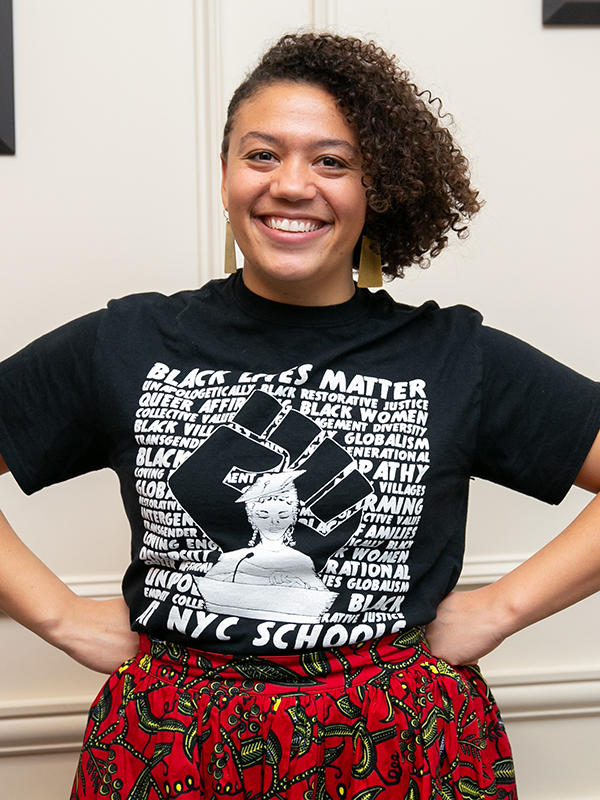
Megan Madison is a 2024 graduate of the PhD in Social Policy program at Heller. She is the co-author of First Conversations, an award-winning series of books for young children on the topics of race, gender, consent, love, bodies, grief, and justice. During her doctoral program at Heller, Megan’s dissertation research examined the impact of “colorblind” policymaking on the racial diversity and equity of the early care and education teaching workforce.
How did you first become interested in early childhood education as a topic for your dissertation?
Before coming to Heller, I taught preschool at the Carole Robertson Center for Learning in Chicago. I remember being directly impacted by a lot of policy decisions and wanting to understand how they were made, so that they could be improved. The main policy failures that inspired me to apply to the program had to do with the early childhood teaching workforce. I knew the importance of stable, trusting relationships for young children, and was shocked by the rates of teacher turnover. I saw the devastating impact of underfunding of early childhood systems, because unlivable, low compensation creates workforce dynamics that have a huge impact on the learning process. This experience ultimately helped me to narrow in on my dissertation topic of policies impacting teachers’ career trajectories, which I then looked at through a racial equity lens.
How did your PhD work at Heller impact your career today?
My dissertation committee really pushed and supported me to dive deeply into theory, so as a part of the proposal process I spent a couple of years exploring Black feminist scholarship and activism, and concentrating on the definitions of race and racism. As a result, the first paper of my dissertation introduces the “Sociopolitical Ecology of Development,” a new theoretical framework that enables the explicit conceptualization of the ways in which systemic racism—at its intersections with other systems of oppression—shapes the ecology of human development, for all people.
First Conversations is an extension of that work. They’re more than children’s books—they are a political and cultural intervention that builds off of the intervention made with my dissertation research. Each book synthesizes the core concepts from an entire field, and then translates those super engaging, revolutionary ideas to the broadest possible audience through approachable writing and thoughtful images.
At Heller, I learned that there’s a relationship between policy and practice, but it’s not so simple. I served on the governing board of the National Association for the Education of Young Children at the time that I was working on my dissertation, a participatory action research project. We led a big fieldwide initiative called “Power to the Profession,” and through this, my work was able to directly influence policymaking in the early childhood field, particularly the teaching workforce. We replaced an outdated, racially colorblind frame and began to consider the disparate racial impact of our decisions, and that feels like a win, but also incomplete. So the books take that work another step, aiming to impact early childhood practice, which has been really satisfying.
What has the reception for your books been like so far?
It’s been incredible—and mixed. When my coauthor Jessica Ralli and I started writing these books, we were told that the average children’s picture book will sell around 10,000 copies in lifetime sales, if you’re lucky. To date, we’ve sold over 200,000 copies. We’ve won a bunch of awards and accolades, and when I talk to teachers and parents, they say our books are something they need in their homes and classrooms, which feels really rewarding. I think our success has to do with the fact that we’re helping to meet a big, unmet need for many families and educators.
We have the numbers to show just how many people support a truly intersectional project like First Conversations, and we’re still going—the seventh book, We Care: A First Conversation About Justice, came out in May 2024, and the eighth book will be published in 2025.
How has the Heller community made a difference in your career?
My dissertation was fairly unconventional by a lot of standards, and I could not have done it without the fantastic committee that I had—I feel deeply honored to have worked with each and every one of them. My fellow cohort members were also incredibly supportive. Since I started in 2011, most, if not all, of the members of my cohort graduated years ago, so it was really challenging for me when I decided to pick back up with my dissertation and finish what I had started. Regardless of how busy they were, my peers were there to hop on the phone and talk things through, and even attend my dissertation hearing, taking notes and standing with me in the hallway while I was anxiously awaiting the results. I did it, and I’m celebrating this accomplishment along with everyone who encouraged me along the way and helped me get across the finish line.
